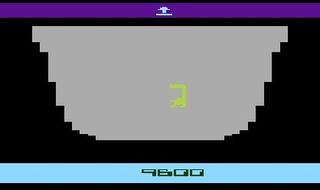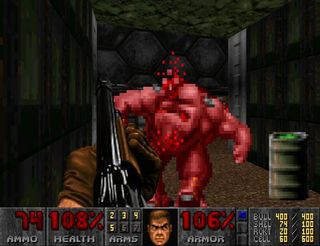The Top 7… hated habits of the mainstream media
See how videogames turn respectable journalists into raving lunatics
“With a click of the code-word 'Hot Coffee' players can view nudity and play sex games. The Feds say ads and packaging for Grand Theft Auto are misleading..." – KUTV-2 News reporter Bill Gephardt, in asomewhat misleading statement
We’ve all seen this a thousand times: Grand Theft Auto is all about beating hookers and taking their money. Call of Duty 4 is about gunning down Arabs, Mass Effect is about boning aliens and the infamous Hot Coffee minigame in GTA: San Andreas could be unlocked by typing in a code phrase, or clicking it, or whatever. For people who view games as too complex to bother understanding, a lot of reporters seem awfully keen to portray them as simple and easily accessible. Particularly to your kids, with the implication being that your kids are naïve, helpless and prone to repeatedly falling into holes without your protection.

Above: Your kids
More often than not, this follows a familiar formula: Game X is about simple, repetitive task Y, and Y is usually a thing that someone finds morally objectionable. Part of that is because the news media, and TV news in particular, like to deal in quick sound bites that are easy to understand and digest.
After all, are you going to get outraged if someone tells you that GTA is a city-spanning crime story that invites exploration and experimentation, enabling players to go on bloody rampages or simply follow the story as they see fit? Or is it better to just tell you it’s that game where you beat hookers to death, so you get good and upset and keep watching?

Above: ‘Where’s the hooker? Is that the hooker? Is this game about a homeless man taking dumps?’
Another reason is that the “perform short mindless task, repeat” model was the basis for most videogames of the ‘70s and early ‘80s – which was, incidentally, the last time a lot of news anchors, reporters and pundits played videogames. Whatever the case, it’s irritating to see people downplay a complex art form as mind-numbing stupidity, and it only lends fuel to the stereotype of gamers as cabbage-brained zombies who can just sit and do the same thing for hours on end.
Sign up to the GamesRadar+ Newsletter
Weekly digests, tales from the communities you love, and more

“A new type of cyberbully known as a griefer is overtaking other forms of aggression on the Internet and in the world of online gaming, a health researcher warned.” – AReuters articlefrom July 2007
“Bill Gephardt is here and he says there is a loophole in a kid's game that could actually allow players to see... porn?" – KUTV-2 News anchor Mark Koelbel, introducing a report that aireda full yearafter the GTA: San Andreas “Hot Coffee” story broke
Obviously, the mainstream media isn’t always going to be on the bleeding edge of gaming news, but it would be nice if they could shorten their lead times a bit. It’s not unusual for a controversy to flare up among gamers, be discussed to death and seemingly put to rest before it’s “uncovered” by a mainstream outlet like it’s something new. Exactly like what happened with the whole “Resident Evil 5 is racist” controversy, whichshocked and fascinatedmainstream columnists long after most gamers had at least grown used to it.

Above: Sigh
Like so many of the media’s bad habits in reporting on games, its embarrassing behind-the-curvenessstarted in earnest in the aftermath of the Columbine High School massacre in 1999. Picking up on the fact that shooters Eric Harris and Dylan Klebold were fans of DOOM, news outlets all but started a moral panic over the “cutting-edge” game and its supposed danger to America’s youth… a full six years after it was first released, and at least three years after its popularity had waned.

Above: OMG IT’S LIKE PLAYING A MOVIE

Above: (What ‘cutting-edge’ actually looked like in early 1999)
Part of the problem is that a lot of reporters – again, not being gamers themselves – don’t fully realize just how fast the industry moves, or how short a lifespan a game has before it’s considered obsolete. With movies or books, a six-year-old work of fiction is considered recent; with videogames, it’s a dusty antique.
That’s probably also explains why some reportersactually think it’s newsthat Xbox Live is full of racist, cursing homophobes. Instead of, you know, a statement on par with “the sky is blue.”

Stellar Blade director "grew up too poor to afford" a PS1, but when he finally got one in college, Ridge Racer and Final Fantasy inspired him to make games

Oh, that's why the Stellar Blade devs were terrified by demo players: one fan's spent "about 60 hours" maxing Eve's skill tree before the action RPG is even out
Most Popular



